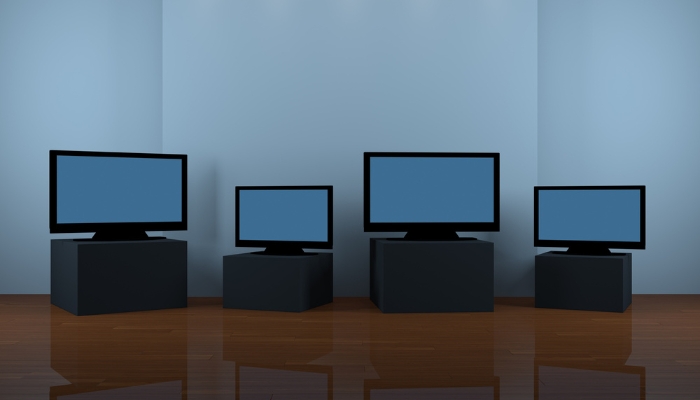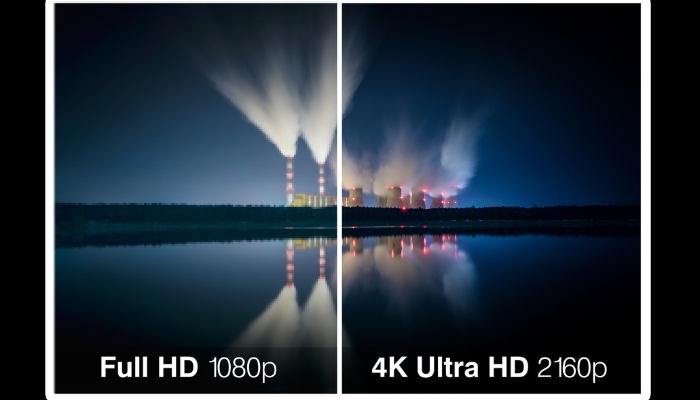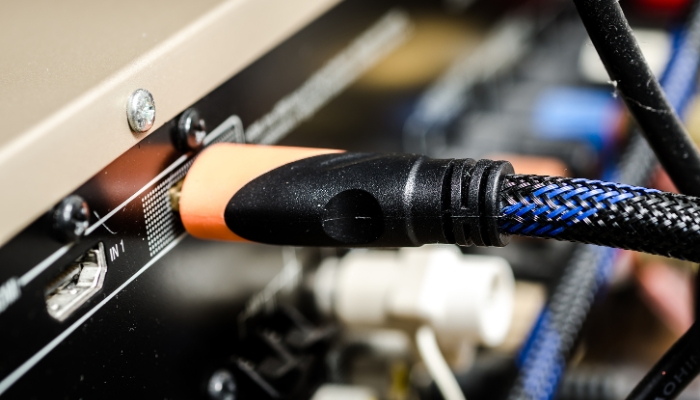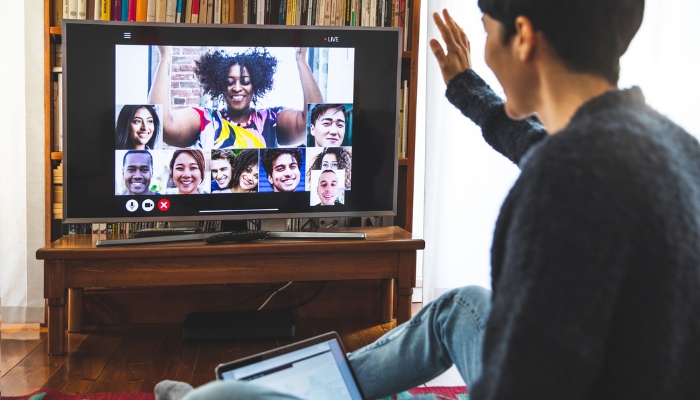Ever looked at your big-screen TV and thought, 'That would make a fantastic computer monitor'? You're not alone! Many of us have been tempted to swap out our traditional computer monitors for the larger, potentially clearer TV display. But is it really a good idea?
There are quite a few factors to consider before making the switch. From resolution and refresh rates to input lag and viewing distance, let's take a look and see if your TV is up to the task!
Screen Size and Viewing Distance

One of the first things you'll notice when using a TV as a monitor is the size. TVs are typically much larger than standard computer monitors. While this might seem like a bonus (who doesn't want a bigger screen, right?), it can actually be a drawback.
The larger the screen, the further away you need to sit to see everything clearly and comfortably. This is known as the viewing distance. For a typical TV, the recommended viewing distance is about 1.5 to 2.5 times the screen's diagonal size. So, if you're using a 55-inch TV as a monitor, you'd need to sit about 7 to 11 feet away for the best viewing experience.
But let's be honest, most of us don't have that type of space on our desks. So, if you're thinking about using a TV as a monitor, consider the size of the screen and how far away you'll be sitting.
Resolution and Screen Quality

Resolution is a crucial factor when considering a TV as a monitor. It refers to the number of pixels displayed on the screen. More pixels mean sharper images and text. Most modern TVs come with at least a 1080p resolution, but for a truly crisp display, you might want to consider a 4K TV (but not everything has a 4K output).
Screen quality is another important consideration. TVs tend to have less accurate color reproduction accuracy and color compression, so colors are always a little off. So, if you're into graphic design or photo editing, this could be a deal-breaker.
Refresh Rate
If you're a gamer, refresh rate is a key factor when using a TV as a computer monitor. The refresh rate is the number of times your screen updates with new images each second. A higher refresh rate means smoother, more fluid images, which is vital in fast-paced games.
Most TVs have a refresh rate of 60Hz, which is fine for general use and watching movies. However, for gaming, you might want to look for a TV with a refresh rate of 120Hz or even 240Hz for the best experience. But don't forget to match the refresh rate with your computer's graphics card!
Pro Tip: Be aware of the tag "motion rate" on TVs; these describe the processing techniques used for better motion clarity and are not the refresh rate. These rates are usually twice the true refresh rate, so keep that in mind!
Input Lag
Input lag might not be something you've thought about before, but it's definitely worth considering, especially if you plan to game. Input lag is the delay between the action you perform on your input device (like a mouse or keyboard) and when it's displayed on the screen. So, the lower the input lag more instant your actions display on the screen, which is vital in fast-paced, competitive gaming where every millisecond counts.
Most TVs have higher input lag than monitors, and some newer models are designed with gaming in mind to reduce input lag. Remember to keep that in mind before choosing a TV as your monitor!
Connectivity Options

When using a TV as a computer monitor, checking the connectivity options is essential. Your TV needs to have the correct ports to connect to your computer.
Most modern computers and TVs use HDMI ports to transmit audio and video signals. However, if you have a high-end graphics card, you might want a TV with a DisplayPort, which can handle higher refresh rates and resolutions. Don't forget to look for USB ports for connecting peripherals or charging devices.
Lastly, if you plan to use the TV's built-in speakers, check if it has an audio return channel (ARC) or enhanced audio return channel (eARC). These allow the TV to send audio data upstream to your audio device, providing better sound quality.
Pro Tip: Some TVs even have USB-C ports, which can handle video, audio, data, and power simultaneously!
Task-Specific Considerations

The tasks you plan to do on your computer can influence whether a TV is a suitable monitor. Whether working or gaming, using your TV as a monitor depends on the situation.
- Work: A big TV screen can be a boon if you're multitasking or working with large spreadsheets. However, a TV might not be the best choice for graphic design or photo editing due to less accurate color reproduction.
- Gaming: Gamers can benefit from the immersive experience of a large TV screen. Just remember to check the refresh rate and input lag for a smooth gaming experience.
- Video Conferencing: If you're working from home and often have video meetings, a larger screen can make it easier to see your colleagues clearly and to give presentations.
Weighing the Pros and Cons
Switching to a TV as your computer monitor can be a game-changer. You get a larger screen for multitasking or gaming; sometimes, a high-quality TV can be more cost-effective than a high-end monitor.
But it's not all sunshine and rainbows. TVs often have lower pixel density, making text less sharp. They can also suffer from slower refresh rates and higher input lag, which isn't ideal for fast-paced gaming. And don't forget the potential ergonomic challenges - you'll need enough space to sit comfortably from the screen.
So, before you make the switch, weigh these pros and cons against your specific needs and preferences.
The Big Picture
Can you use a TV as a computer monitor? Absolutely! But whether it's the right choice depends on what you're using it for. But don't worry; at Toton’s TV, we've got a wide range of TVs to suit all your needs. So why not give us a call or drop by and find your perfect match? Our team is always here to help you make the right choice.